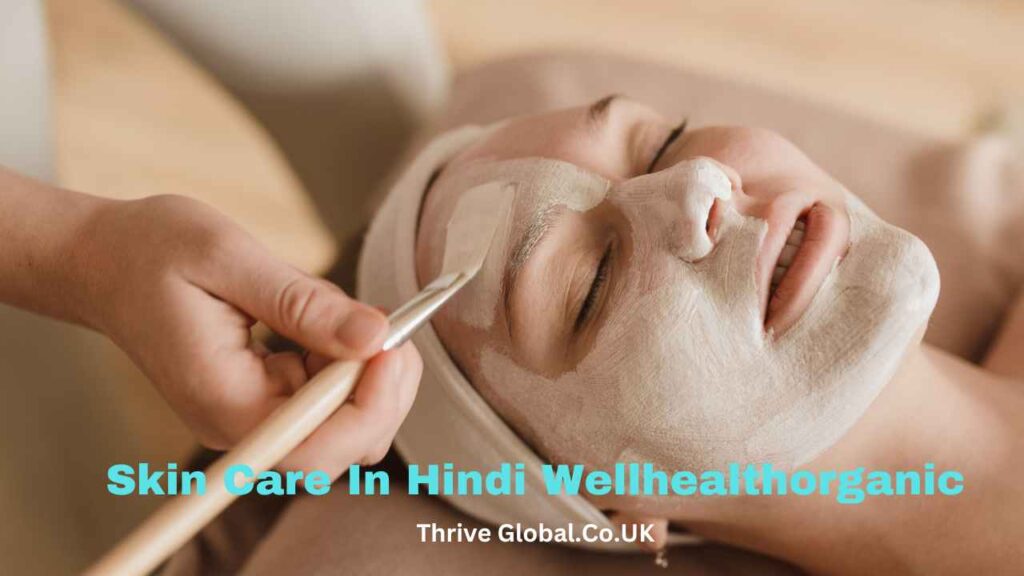Skin Care In Hindi Wellhealthorganic, taking care of your skin is more than just a daily chore; it’s a commitment to maintaining your health and appearance. In today’s world, where pollution and stress are constant companions, having a good skin care routine is essential.
Skin Care In Hindi Wellhealthorganic has emerged as a trusted guide in skin care, offering a wide range of products that cater to various skin needs. But what’s even more exciting is the availability of skin care information and products in Hindi, making it accessible to a larger audience.
Now get skin care tips with a focus on Wellhealthorganic and the benefits of accessing this information in Hindi.
Skin Care In Hindi Wellhealthorganic, Understanding Your Skin
Skin Types
Knowing your skin type is the first step in establishing an effective skin care routine. There are generally five main skin types: normal, oily, dry, combination, and sensitive. Each type has its own set of characteristics and requires different care:
- Normal Skin: Balanced, not too oily or dry.
- Oily Skin: Prone to acne, shiny appearance, enlarged pores.
- Dry Skin: Feels tight, may have flaky patches, prone to irritation.
- Combination Skin: Oily in the T-zone (forehead, nose, and chin) and dry elsewhere.
- Sensitive Skin: Easily irritated, prone to redness and reactions.
Common Skin Problems
Understanding common skin issues can help you address them more effectively. Some prevalent problems include:
- Acne: Often caused by clogged pores, bacteria, or hormonal imbalances.
- Hyperpigmentation: Dark spots caused by sun damage or inflammation.
- Eczema: Inflammatory condition causing red, itchy patches.
- Psoriasis: Autoimmune condition leading to thick, scaly patches.
The Basics of Skin Care
A solid skin care routine typically involves three main steps: cleansing, toning, and moisturizing. Cleansing removes dirt and impurities, toning helps balance the skin’s pH, and moisturizing keeps the skin hydrated.
Daily Skin Care Routine
Morning Routine
Start your day with a gentle cleanser to remove any sweat and oils that accumulated overnight. Follow this with a toner to refresh your skin and a lightweight moisturizer to keep your skin hydrated throughout the day. Don’t forget to apply sunscreen to protect your skin from harmful UV rays.
Evening Routine
Your evening routine should focus on repairing and rejuvenating your skin. Use a cleanser to remove makeup and impurities, followed by a toner. Applying a night cream or serum can help repair your skin overnight.
Weekly Treatments
Incorporate treatments like exfoliation and masks into your routine once or twice a week. Exfoliating helps remove dead skin cells, while masks can provide deep hydration or target specific skin concerns.
Natural Skin Care Remedies
Benefits of Natural Ingredients
Natural ingredients are often gentler on the skin and free from harmful chemicals. They are also rich in nutrients that can nourish the skin.
Common Natural Ingredients Used in India
India is home to a plethora of natural ingredients that are beneficial for the skin:
- Turmeric: Known for its anti-inflammatory and brightening properties.
- Aloe Vera: Soothes and hydrates the skin.
- Neem: Has antibacterial properties that help combat acne.
- Sandalwood: Provides cooling and antiseptic benefits.
DIY Skin Care Recipes
Here are some easy-to-make skin care recipes using natural ingredients:
- Turmeric Face Mask: Mix turmeric, honey, and yogurt for a brightening mask.
- Aloe Vera Gel: Apply fresh aloe vera gel to soothe irritated skin.
- Neem Paste: Blend neem leaves with water to create a paste for acne treatment.
Products Recommended by Wellhealthorganic
Overview of Wellhealthorganic’s Skin Care Range
Wellhealthorganic offers a variety of products tailored to different skin needs, including cleansers, toners, moisturizers, and serums. Their products are formulated with natural ingredients, ensuring gentle and effective care.
Best Products for Different Skin Types
- For Oily Skin: Look for products with salicylic acid and tea tree oil.
- For Dry Skin: Opt for products with hyaluronic acid and shea butter.
- For Sensitive Skin: Choose fragrance-free and hypoallergenic products.
How to Choose the Right Product
Identify your skin type and concerns, then select products that target those specific needs. Reading product labels and reviews can also help in making an informed decision.
Skin Care Tips for Different Seasons
Summer Skin Care
In the summer, focus on keeping your skin cool and protected from the sun. Use lightweight, non-comedogenic products and apply sunscreen regularly.
Winter Skin Care
Winter can be harsh on the skin, leading to dryness and irritation. Use heavier moisturizers and avoid hot showers, which can strip the skin of its natural oils.
Monsoon Skin Care
The monsoon season can cause humidity-related issues like fungal infections. Keep your skin clean and dry, and use products that help control oil and bacteria.
Also Read: Book32 A Step-by-Step Tutorial
Diet and Skin Health
Foods That Improve Skin Health
Eating a balanced diet rich in vitamins and antioxidants can improve your skin health. Include fruits, vegetables, nuts, and seeds in your diet.
Foods to Avoid for Better Skin
Avoid foods high in sugar and refined carbs, as they can lead to breakouts and dull skin. Also, reduce your intake of dairy if you are prone to acne.
Importance of Hydration
Drinking plenty of water keeps your skin hydrated and helps flush out toxins. Aim for at least 8 glasses of water a day.
Lifestyle Tips for Glowing Skin
Importance of Sleep
Adequate sleep is crucial for skin repair and regeneration. Aim for 7-8 hours of sleep each night.
Exercise and Skin Health
Regular exercise boosts circulation and helps deliver oxygen and nutrients to your skin, giving it a healthy glow.
Stress Management
High stress levels can lead to skin issues like acne and eczema. Practice stress-relief techniques such as yoga and meditation.
Common Skin Care Myths
Debunking Popular Myths
- Myth: Oily skin doesn’t need moisturizer. Truth: All skin types need hydration to maintain balance.
- Myth: Tanning clears up acne. Truth: Tanning can actually worsen acne and cause long-term damage.
Truths About Skin Care
- Consistency is key for effective skin care.
- Natural ingredients can be as effective as commercial products.
- Always wear sunscreen, regardless of the weather.
Consulting a Dermatologist
When to See a Dermatologist
If you have persistent skin issues or if over-the-counter products aren’t effective, it’s time to see a dermatologist.
What to Expect During a Visit
A dermatologist will examine your skin, discuss your concerns, and recommend treatments or medications. Be prepared to provide your medical history and current skin care routine.
Questions to Ask Your Dermatologist
- What is my skin type?
- Which products should I use for my specific skin concerns?
- Are there any treatments that can improve my skin condition?
Conclusion
Taking care of your skin is a journey that requires patience and consistency. By understanding your skin type, using the right products, and maintaining a healthy lifestyle, you can achieve glowing, healthy skin. Wellhealthorganic provides an excellent range of products and resources in Hindi, making it easier for you to take the best care of your skin.
Also Read: Story of Kase Abusharkh Amy Berry Innovators and Philanthropists
FAQs
What is the best way to take care of oily skin?
The best way to take care of oily skin is to use a gentle cleanser, a toner that helps control oil, and a lightweight, oil-free moisturizer. Regular exfoliation can also help keep pores clear.
How often should I exfoliate my skin?
Exfoliating 1-2 times a week is usually sufficient for most skin types. Over-exfoliating can cause irritation and damage to the skin barrier.
Are natural remedies effective for skin care?
Yes, many natural remedies are effective for skin care. Ingredients like aloe vera, turmeric, and honey have beneficial properties that can soothe, brighten, and hydrate the skin.
What foods should I avoid for better skin?
Avoid foods high in sugar, refined carbs, and dairy if you are prone to acne. These can exacerbate skin issues and lead to breakouts.
How can I prevent acne breakouts?
To prevent acne breakouts, maintain a consistent skin care routine, avoid touching your face, use non-comedogenic products, and manage stress levels.



